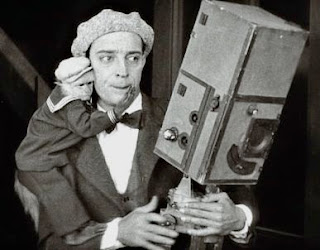
-Mr. Stone Face
This film marks the beginning and end of Buster Keaton’s career. I can explain; MGM had just taken Keaton under their wing due to his massive success with earlier films such as Sherlock Jr., Our Hospitality, Seven Chances, and of course The General, however they pulled him from director position for whatever cockamamie reason. Also under his new contract, he was to make only the movies he was given, this being the first project. Soon after this film, however, MGM took more and more of his creative control away, either forcing him to do silent films during the talkie era or forcing him to do talkies when he had no experience, and this led to a downfall in his inspired impetus and popularity.

Strangely though, the film was used for many years by MGM as an example of a perfect comedy and, according to IMDb, the studio would get all its directors and producers to watch it and learn. The gags in the film were mostly well-choreographed beforehand, although three scenes were improvised on the spot, those being the miming in Yankee stadium, the scene of Keaton throwing his piggybank around his room, and the utterly brilliant dressing room scene. Keaton grabbed a random crew member who looked appropriately ill-mannered and let the camera roll for one long take as the two men threw themselves into the mini cubicle, unrehearsed, to wing the whole thing first time through.

Also, I thought this was really funny:
“According to Rudi Blesch's biography of Buster Keaton, he came on the set the first day of shooting and, unaware of his reduced status as actor-only, began to "feel" for comedy bits and request props and characters, as he had with his own company. Director Edward Sedgwick took him aside and told Buster that he was undermining his directorial authority. Buster genuinely apologized and faded into the background. Sedgewick couldn't get the set-ups he wanted, couldn't get the actors to understand his direction, and eventually gave up and asked Buster to take over. As quietly as he had left, Buster regained control of the scene. Buster began to call Sedgewick "Junior" and they became fast friends.”

Now, aside from it being a brilliant, well-made comedy, two things struck me upon first viewing. Firstly, the second half of the film, starting with Keaton filming the war in the street and everything following, seems to, without aspiration I don’t think, unapologetically depict was has become of the contemporary media. Secondly, I find it incredibly odd that this is basically Keaton’s last great film before MGM ruining him, and yet his character is suckered into this corporation through, primarily, love (the girl/cinema) and filming a terrible event (war/his following films). What say you, chums?






